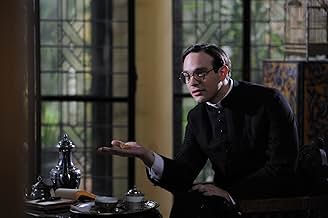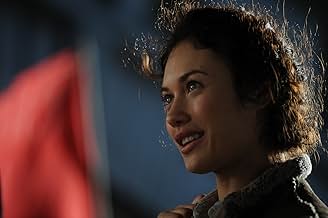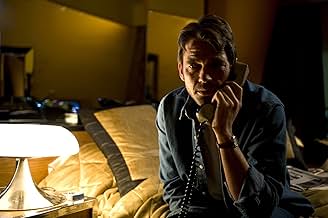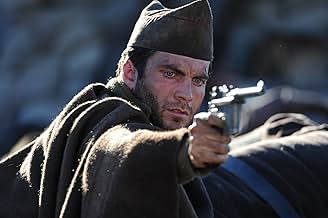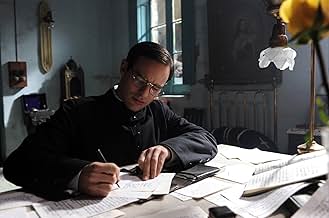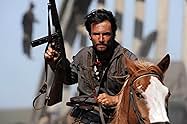NOTE IMDb
5,7/10
5,2 k
MA NOTE
Biopic consacré à Jose Maria Escriva de Balaguer, fondateur de l'ordre de l'Opus Dei.Biopic consacré à Jose Maria Escriva de Balaguer, fondateur de l'ordre de l'Opus Dei.Biopic consacré à Jose Maria Escriva de Balaguer, fondateur de l'ordre de l'Opus Dei.
- Réalisation
- Scénario
- Casting principal
- Récompenses
- 2 nominations au total
Jordi Mollà
- Don José
- (as Jordi Mollá)
Juan Cruz Rolla Knight
- Young Josemaría
- (as Juan Cruz)
Avis à la une
I have just been invited to watch the movie during a screening presentation in Rome and after several hours I'm still deeply touched. It's a film that makes you think, reflect. It's not an easy action movie, and in that sense, some maybe would get disappointed if they are thinking of it as another war movie. It's a drama that despite the cruel events that portraits opens your heart to hope and puts you on the quest for transcendence. As "The Mission", this new Joffe's film, uses the "paralel" life of two friends to show how difficult it is to make a fair decision while you are under stressful circumstances. Some people may judge this film as the Opus Dei answer to the Da Vinci Code attacks, and in a certain sense it is, but the film is not a propaganda movie, but a deep meditation from an agnostic point of view of the sense of life.
Spanish/US co-production developing dramatic deeds during Spanish Civil War and the historic figure about Jose Maria Escriba De Balaguer . Enjoyable biographic movie well written and played , being compellingly directed by Roland Joffé . Arising out of the terror of the Spanish Civil War, a candidate for canonization is investigated by a reporter (Dougray Scott) who aware his own estranged father (Wes Bentley) had a deep, dark and devastating connection to the saint's (Charlie Cox) life .
This interesting film is full of compelling drama with love , passion and subsequent betrayal , touching scenes , historical events and good feeling . It is a simple , dramatic and intelligent portrait of a time when the Spanish people live taking on among them . This is an agreeable account of the survival of the human spirit against difficulties ; an epic portrayal of Faith, Forgiveness and Redemption . The movie is plenty of graphic , striking and memorable moments about timeless power of forgiveness and dictating a strong emotional response from the spectator , though some moments is unrealistic . Interesting and thought-provoking movie with evident excitement that can sometimes be undercut by inadequacies in the screenplay , being written and adapted by the same Roland Joffé . This moving picture results to be a breathtaking spectacle about dramatic consequences of Spanish civil war , including strong emotions , brooding dialog and a heartbreaking final . ¨There be dragons¨ or ¨Encontrarás Dragones¨ results to be other of the innumerable stories to deal with dramatic deeds regarding the Civil War background , a familiar theme about the global horrors of a fratricide war , impossible to forget to Spanish cinema . However the story needs a vibration more real than the one offered in this slow-moving and sometimes dull film . But anyway, its is compensated with the great performances from main cast as Charlie Cox as Josemaría Escrivá , Wes Bentley as Manolo Torres as Dougray Scott as Roberto Torres as Rodrigo Santoro as Oriol , Olga Kurylenko as Ildiko and sensational support cast , mostly Spanish , such as Unax Ugalde , Ana Torrent and Jordi Molla , interpreters who provided a considerable boost to the result . Furthermore , a spotless pictorial cinematography by Gabriel Beristain and a willingness , almost perfect of the elements of each shot , every sequence, every space .
The film develops an intrigue by means of flashbacks and dealing with Jose Maria Escriba De Balaguer's life . The events were the following : during the Spanish Civil War , Escrivá was hidden in a psychiatric sanatorium and fled from Madrid, which was under republican control, via Andorra and France, to the city of Burgos, held by the nationalist forces of General Francisco Franco. After the war ended in 1939 with Franco's victory, Escrivá was able to resume his studies in Madrid and complete a doctorate in law. His principal work was the foundation, government and expansion of Opus Dei.
The motion picture was well directed by the British Roland Joffé , being realized in academic style and general coldness , filmed in his usual formal and stylistic scholarship , without leaving a trace the thought-provoking issues , in terms of dramatic and narrative excitement . He is a good filmmaker mainly of epic subjects . After a long career filming for television , he made his movie debut in a big way with ¨The killing fields¨ winner of three Oscar and dealing with madness and atrocities committed by humans , Joffe's usual theme. ¨The mission¨, one of his greatest hits , had Palme d'or at Cannes , a graphic monument to Portuguese oppression in South-America , but Joffe has not quite held his place at the top level . He subsequently directed ¨Fat Man and Little Boy¨ referring to two atomic bombs dropped by America on Japan . Joffe's meagre output for the cinema makes it all the more surprising that he has turned out three splendid films and several others near-disasters such as ¨The scarlet letter¨, ¨Captivity¨, and ¨You and me¨. Rating ¨Encontraras Dragones¨ : Better than average , worthwhile watching .
This interesting film is full of compelling drama with love , passion and subsequent betrayal , touching scenes , historical events and good feeling . It is a simple , dramatic and intelligent portrait of a time when the Spanish people live taking on among them . This is an agreeable account of the survival of the human spirit against difficulties ; an epic portrayal of Faith, Forgiveness and Redemption . The movie is plenty of graphic , striking and memorable moments about timeless power of forgiveness and dictating a strong emotional response from the spectator , though some moments is unrealistic . Interesting and thought-provoking movie with evident excitement that can sometimes be undercut by inadequacies in the screenplay , being written and adapted by the same Roland Joffé . This moving picture results to be a breathtaking spectacle about dramatic consequences of Spanish civil war , including strong emotions , brooding dialog and a heartbreaking final . ¨There be dragons¨ or ¨Encontrarás Dragones¨ results to be other of the innumerable stories to deal with dramatic deeds regarding the Civil War background , a familiar theme about the global horrors of a fratricide war , impossible to forget to Spanish cinema . However the story needs a vibration more real than the one offered in this slow-moving and sometimes dull film . But anyway, its is compensated with the great performances from main cast as Charlie Cox as Josemaría Escrivá , Wes Bentley as Manolo Torres as Dougray Scott as Roberto Torres as Rodrigo Santoro as Oriol , Olga Kurylenko as Ildiko and sensational support cast , mostly Spanish , such as Unax Ugalde , Ana Torrent and Jordi Molla , interpreters who provided a considerable boost to the result . Furthermore , a spotless pictorial cinematography by Gabriel Beristain and a willingness , almost perfect of the elements of each shot , every sequence, every space .
The film develops an intrigue by means of flashbacks and dealing with Jose Maria Escriba De Balaguer's life . The events were the following : during the Spanish Civil War , Escrivá was hidden in a psychiatric sanatorium and fled from Madrid, which was under republican control, via Andorra and France, to the city of Burgos, held by the nationalist forces of General Francisco Franco. After the war ended in 1939 with Franco's victory, Escrivá was able to resume his studies in Madrid and complete a doctorate in law. His principal work was the foundation, government and expansion of Opus Dei.
The motion picture was well directed by the British Roland Joffé , being realized in academic style and general coldness , filmed in his usual formal and stylistic scholarship , without leaving a trace the thought-provoking issues , in terms of dramatic and narrative excitement . He is a good filmmaker mainly of epic subjects . After a long career filming for television , he made his movie debut in a big way with ¨The killing fields¨ winner of three Oscar and dealing with madness and atrocities committed by humans , Joffe's usual theme. ¨The mission¨, one of his greatest hits , had Palme d'or at Cannes , a graphic monument to Portuguese oppression in South-America , but Joffe has not quite held his place at the top level . He subsequently directed ¨Fat Man and Little Boy¨ referring to two atomic bombs dropped by America on Japan . Joffe's meagre output for the cinema makes it all the more surprising that he has turned out three splendid films and several others near-disasters such as ¨The scarlet letter¨, ¨Captivity¨, and ¨You and me¨. Rating ¨Encontraras Dragones¨ : Better than average , worthwhile watching .
Nice cinematography. Weak script, Weak special effects. some dark scenes that didn't have to be.
The music, oh my horror, what can I say about the music. The swelling crescendos,everywhere, the loud volume, drowning out the dialog, and the most inappropriate music at the most inappropriate times, oh my horror, the most horrible music. After a half hour, I was left to myself to watch the thing, the music chased all the others away. Did I mention the music, oh my horror, the miserable horrible music, wrecking what could have been.
In the last half of the movie, I could see the actors were all tired of this, their efforts were drawn and tired, they had succumbed, they had had enough, long before the audience collapsed.
I'm sure the cutting room floor was littered with performances that were absolutely horrible, the actors were sick of this project and just wanted, no needed, to run away.
In Blu-Ray, at a cost of $2.99, cheaper than a bad movie at the theatre and I could at least drown myself in beer.
The music, oh my horror, what can I say about the music. The swelling crescendos,everywhere, the loud volume, drowning out the dialog, and the most inappropriate music at the most inappropriate times, oh my horror, the most horrible music. After a half hour, I was left to myself to watch the thing, the music chased all the others away. Did I mention the music, oh my horror, the miserable horrible music, wrecking what could have been.
In the last half of the movie, I could see the actors were all tired of this, their efforts were drawn and tired, they had succumbed, they had had enough, long before the audience collapsed.
I'm sure the cutting room floor was littered with performances that were absolutely horrible, the actors were sick of this project and just wanted, no needed, to run away.
In Blu-Ray, at a cost of $2.99, cheaper than a bad movie at the theatre and I could at least drown myself in beer.
The problem with this film at IMDb is to know the real and final score. Right now is eight (8). 119 users of 147 voted ten (10), 14 voted nine (9), 6 voted eight (8). The others users voted lower than six (6). Well, or this is a spectacular film or we have a problem here. This score seems to me a little unreal and unbelievably.
Knowing Opus Dei since 1980, I think these 119 users are probably Opus Dei voters only and want to keep the score so higher as possible.
Why does this matter? Because a score should be representative and product of neutral or spontaneous voting. Well, I can barely believe this is the case. Let's see what happen in the next months.
And what about the film? Well, if somebody wants to know about Escriva and his Opus Dei, this film does not tell too much.
This is a very light film without any real information and questions like: How Opus Dei as organization was actually built since 1928? Why Opus Dei is in a very deep internal crisis since ten or fifteen years ago? Why a lot of people are leaving Opus Dei in the last years (in Spain, Mexico, Argentina, etc.)? Why is not so easy to leave Opus Dei? Yes, it is not easy but a lot of people fight for. Is it true that Escrivá declared whoever leaves Opus Dei will suffer a lot in this life and his eternal salvation will be in danger? Why so many celibate members suffer from depression? Is it possible that Opus Dei psychiatrists do not keep the professional secrecy and inform to Opus Dei superiors if a member talks about leaving Opus Dei? Yeah, that is a tough question to be made. How is possible that Escrivá became saint mainly because the testimony of his confessor? Why celibate members have to make a will (pro Opus Dei) like monks do before the perpetual incorporation? Why celibate members have to give their salary away like some monks do? Why lay members have to request a pardon of departure (dispense) to leave Opus Dei (like monks do) only need in the case of sacred vows? Is that because without knowing they really are bounded by some kind of sacred vows? Why lay persons have obligations - without knowing and without consent- that the Code of Canon Law established only for a consecrated life? Is there any kind of deception in all of this?
After these questions, you know a serious film about Opus Dei and Escrivá is waiting to be made.
I am not going to vote. I rather write this brief review.
Knowing Opus Dei since 1980, I think these 119 users are probably Opus Dei voters only and want to keep the score so higher as possible.
Why does this matter? Because a score should be representative and product of neutral or spontaneous voting. Well, I can barely believe this is the case. Let's see what happen in the next months.
And what about the film? Well, if somebody wants to know about Escriva and his Opus Dei, this film does not tell too much.
This is a very light film without any real information and questions like: How Opus Dei as organization was actually built since 1928? Why Opus Dei is in a very deep internal crisis since ten or fifteen years ago? Why a lot of people are leaving Opus Dei in the last years (in Spain, Mexico, Argentina, etc.)? Why is not so easy to leave Opus Dei? Yes, it is not easy but a lot of people fight for. Is it true that Escrivá declared whoever leaves Opus Dei will suffer a lot in this life and his eternal salvation will be in danger? Why so many celibate members suffer from depression? Is it possible that Opus Dei psychiatrists do not keep the professional secrecy and inform to Opus Dei superiors if a member talks about leaving Opus Dei? Yeah, that is a tough question to be made. How is possible that Escrivá became saint mainly because the testimony of his confessor? Why celibate members have to make a will (pro Opus Dei) like monks do before the perpetual incorporation? Why celibate members have to give their salary away like some monks do? Why lay members have to request a pardon of departure (dispense) to leave Opus Dei (like monks do) only need in the case of sacred vows? Is that because without knowing they really are bounded by some kind of sacred vows? Why lay persons have obligations - without knowing and without consent- that the Code of Canon Law established only for a consecrated life? Is there any kind of deception in all of this?
After these questions, you know a serious film about Opus Dei and Escrivá is waiting to be made.
I am not going to vote. I rather write this brief review.
What a dirge of a movie. Trying to be an epic film about the Spanish War, the Catholic church and the unearthing of grave secrets...it really doesn't hit any of those points well.
Le saviez-vous
- AnecdotesThe title comes from the phrase "here be dragons" which was written on old maps to denote dangerous or uncharted areas.
- GaffesThe sub machine gun that the rebel leader Oriol takes from the wrecked combat car to pose with Ildiko is a Thompson M1 or M1-A1, as shown by the charging handle on the right and the simplified rear sight. This was not introduced until 1942, six years after the events in the movie.
- Versions alternativesBecause of poor box-office performance in 2011, the film was re-edited and re-released in the USA in 2012, under the title "There Be Dragons: Secrets of Passion". This new version is shorter (106 minutes) and has a new music scored by Robert Folk.
- ConnexionsFeatured in Saint of the Ordinary: The Making of There Be Dragons (2011)
Meilleurs choix
Connectez-vous pour évaluer et suivre la liste de favoris afin de recevoir des recommandations personnalisées
- How long is There Be Dragons?Alimenté par Alexa
Détails
- Date de sortie
- Pays d’origine
- Sites officiels
- Langue
- Aussi connu sous le nom de
- There Be Dragons
- Lieux de tournage
- Sociétés de production
- Voir plus de crédits d'entreprise sur IMDbPro
Box-office
- Budget
- 36 000 000 $US (estimé)
- Montant brut aux États-Unis et au Canada
- 1 069 334 $US
- Week-end de sortie aux États-Unis et au Canada
- 705 537 $US
- 8 mai 2011
- Montant brut mondial
- 4 372 642 $US
- Durée2 heures 2 minutes
- Couleur
- Mixage
- Rapport de forme
- 2.35 : 1
Contribuer à cette page
Suggérer une modification ou ajouter du contenu manquant









